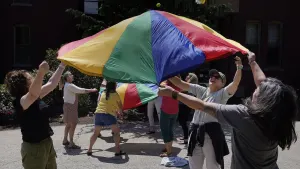More Stories
News 12's Elizabeth Hashagen was joined by Dr. Thomas McGinn to talk about COVID-19 variants and holiday gatherings this year.
Pfizer says its COVID-19 antiviral pill will protect against severe disease, even from the omicron variant. The company said the pill reduced the risk of hospitalization and death by 89% if given within three days of the onset of symptoms. If given within five days, the risk was reduced almost as much to 88%.
A new COVID-19 nasal spray therapy aims to "reduce viral load in the lungs by 100-fold." A new type of COVID-19 therapy is showing promise as a new tool to hijack the virus and slow down variants. It's a new weapon that could be added to the arsenal against COVID-19. Unlike many others, this therapy is proving its efficacy with one dose.
The class of COVID-19 drugs known as monoclonal antibodies - bio-engineered versions of virus-fighting natural proteins - is designed to latch on to the spike protein on the surface of the coronavirus, but omicron has been found to have an unusually high number of mutations on the spike. Do we need to start rethinking how we use monoclonals?
An early study of coronavirus cases in South Africa suggests that, so far, Omicron seems to cause lower rates of hospitalization than previous versions of the virus.
The study — which was released on Tuesday and is based on only three weeks of data — points to less severe illness from the new variant but also shows waning vaccine efficacy and a higher risk of breakthrough infections for omicron. Epidemiologists have cautioned that data from a few more weeks would be needed to draw firmer conclusions, in part because the variant has not yet spread widely and because only a small percentage of infected people become ill enough to be hospitalized.
Another study, according to a new lab study, omicron infects and multiplies 70x faster than the delta variant and the wild type SARS-CoV-2 in the human bronchus, but not in the lung.
Cornell University called a "red alert" for students -- moving all finals online, canceling on-campus events and closing facilities -- as COVID-19 infections rose more 20x in just a week. NYU and Syracuse University announced that all eligible students and employees must get COVID-19 booster shots.
Antigen tests had high sensitivity in detecting the SARS-CoV-2 virus in symptomatic patients in the community. Antigen tests might have a higher sensitivity in detecting SARS-CoV-2 within seven days after symptom onset. Antigen tests are sensitive in detecting SARS-CoV-2 in patients with a Ct value less than or equal to 35. Therefore, antigen tests might be an effective tool in the effort to block SARS-CoV-2 transmission.
More from News 12
1:28

5 simple steps for long-term benefits to your health and heart
1:32

8 tips for working safely during hot weather
3:31

Guide: Ways to set your child up for financial success
3:18

Guide: The importance of good sleep and how to get it

Guide: Mental health resources available in the tri-state
9:36
